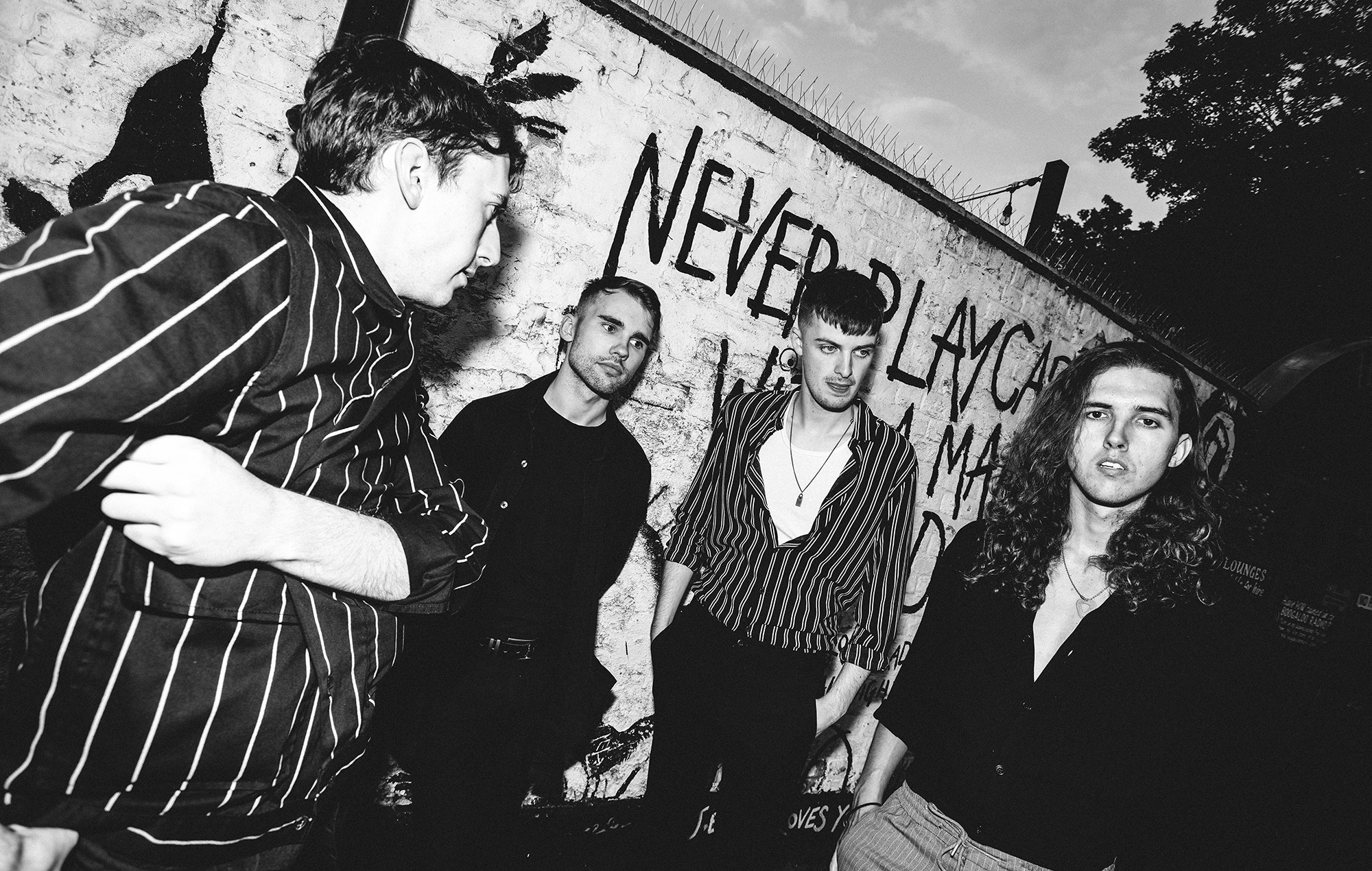
The Clockworks: Galway’s Alan McGee-approved breakouts relish the competition
Picture this: legendary Creation Records boss Alan McGee is at your rehearsal space comparing you to early Oasis, and signs you on the spot. “That’s going to look really good at the top of the NME,” The Clockworks’ Sean Connelly laughs on Zoom from the band’s London home.
Namechecking McGee as a fan has become the standard for the Galway four-piece – even if they did get called “cocky little fuckers” by the man himself recently. “We expected the worst,” drummer Damian Greaney recalls about their first meeting with McGee. “We’d watched documentaries and read books about him, so we were prepared for a one-song-and-out situation.” But they needn’t have worried: after introducing themselves with the punchy ‘Bills and Pills’, later released as a single on McGee’s current label It’s Creation Baby in 2019, he’s loved every second.
Since then, his unwavering belief in the band has been a driving force for The Clockworks. “He doesn’t bother with ego or bullshit, and always says: ‘I can lie about anything, but I can’t lie about music’. It’s why he’s so likeable, because he says everything with such true conviction,” explains singer and guitarist James McGregor. “He really doesn’t give a shit about deceiving you, so he’ll tell you if he doesn’t like something. It’s never rude, but everything we’ve done has been better because of it.”
The Clockworks are a story of growth, with their sound mirroring their progression. In the eight years since McGregor, Greaney and Connelly first met at school, with bassist Tom Freeman joining later at university, they’ve learned everything they know “on the job”, having swapped around instruments and taught each other how to play. The transition from the Damien Rice-inspired acoustics of their school days to their current frantic brand of indie post-punk was a natural headway, as their increased ability let them play at faster tempos and experiment with different genres.
Growing up near Galway in west Ireland where “no two bands sound the same” they also had complete sonic autonomy, as there were no obligations to fit into a scene in order to book gigs. As a result they were free to “trip down rabbit holes to find who influenced our influences”, taking them from Delta blues pioneer Robert Johnson right through to Billie Eilish. They do fit in with Ireland’s post-punk crowd, though, with similarities to The Murder Capital and Fontaines D.C., while their tongue-in-cheek, Streets and John Cooper Clarke-style lyrical colloquialisms don’t go unnoticed, either.
Even with such musical freedom available to them, The Clockworks found their ambition being limited by their home city. Once they’d sold out Róisín Dubh, Galway’s most notable venue, the next logical step was to move to London. “There wasn’t much above us [to aim for]. There’s U2 but they were clouds above, so we had nothing to shadow [in Galway],” Greaney explains about their predicament.
The Clockworks therefore packed their bags and headed for the capital, albeit with nowhere to live and no jobs secured. However, in a matter of days post-move, plans to up their game were accelerated after attending a gig by new-wave punks Talk Show. “It was a ‘shit, game on’ moment,” Connelly recalls of the band’s desire to start writing again following that show. “It made us hungrier and brought out our competitive side. Galway’s very laidback, whereas it’s a mile-a-minute in London, so our hard work ethic could shine through.”
And shine through it did: just months later The Clockworks’ sound engineer flew over, having not heard them play since the move to London. His reaction? “What the fuck was that? How did that happen?!”
London’s freedom has played perfectly into the band’s knack for finding relatable intrigue in the mundanity of day-to-day life. McGregor’s lyrical insight into the woes of customer service in aggy-anthem ‘Can I Speak To A Manager?’ is more than just complaining about “Tina… a jobsworth”, but rather an attempt to find purpose in a failing society. The band’s ode to the hustle and bustle of London-living in ‘Feels So Real’ is in a similar vein: the observational cries of “tripping over bottle tops, skip round syringes / Trollies in the river and gates off their hinges” pair with the track’s intense yet energetic backing that offers some hope in the apparent hostility.
With such a reliance on the familiar of the everyday, the upheaval of the last 12 months could have so easily become an insurmountable challenge for the band. But one comment stuck with The Clockworks throughout: “There’s no pressure to get a six-pack”. Rather than embarking on a rigorous exercise routine, the band instead set their sights on achieving some sort of creative output without it feeling forced. “Inspiration had left the door without saying goodbye,” McGregor says. “After a while it was clear this wasn’t going away, so we started to push ourselves more.”
With simple additions like throwing in some cowbell or writing on the piano (rather than being solely focused on what would work in their live show), The Clockworks have learned to trust their gut. Having already built a solid foundation that they know works, now’s the time to have some fun and show what they can really do.

![Music Remover from Video in 2025 [Top 6 Review]](https://edmislife.com/wp-content/uploads/2025/07/unnamed-29-png.webp)
